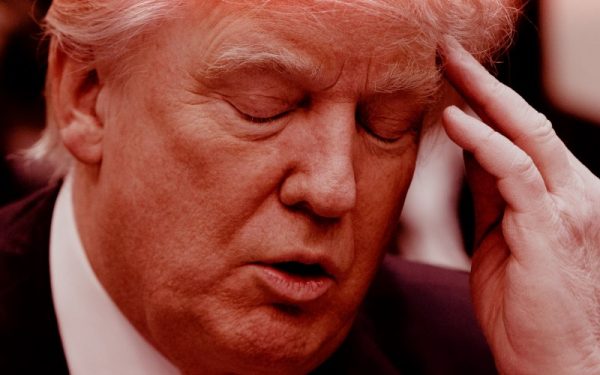 For the most part, the results of the new NBC News-Wall Street Journal national poll are in line with other recent surveys. President Trump, the pollsters found, is underwater in his approval rating — meaning that more people disapprove of the job he’s doing than approve.
For the most part, the results of the new NBC News-Wall Street Journal national poll are in line with other recent surveys. President Trump, the pollsters found, is underwater in his approval rating — meaning that more people disapprove of the job he’s doing than approve.

This makes him “the first president of the post-World War II era with a net negative approval rating in his first gauge of public opinion,” in the words of the Journal’s Michael Bender.
Other recent polls have found the same thing, with the split largely falling along partisan lines. Republicans tend to think Trump is doing very well; Democrats, not so much. That’s probably in part why a majority of those asked by NBC and the Journal said that Trump is doing about as they expected: His party expected him to do well and his opponents didn’t.

The pollsters then asked an interesting question: Did respondents think that Trump’s stumbles — a “number of challenges that the Trump administration has faced early on,” as they put it — were simply the growing pains of a new administration, or a function of Trump making mistakes? Most people said the latter — about in line with the results on the approval rating.

There’s an interesting question that floats underneath the surface of concerns about how Trump’s first month has gone. The administration is insistent that people should think that any problems are growing pains — if there are any “challenges” at all, which they’re generally loath to concede. The president and his allies have generally insisted not only that things are going well, but that suggestions of hiccups are, in fact, a function of media bias. “Fake news,” and all that.
So is that message resonant? Do people think that the media unfairly shaped opposition to Trump? A graph in the Journal’s story broaches the subject.

Except you’ll note that the question isn’t actually about the media. It’s about the media “and other elites.”
As it turns out, the question is even more bizarrely lopsided than just that. In full, it asked people whether they agreed or disagreed with the statement: “The news media and other elites are exaggerating the problems with the Trump administration because they are uncomfortable and threatened with the kind of change that Trump represents.”

Asking whether people thought the media was being unfair would be useful! Do you agree with this statement: “The media is being unfairly critical of President Trump.” Simple enough.
Looping in the idea that the media is part of a shadowy cabal of elites — a not-uncommon assumption, mind you, however questionable — shifts the weight of the question dramatically. Are elites out to get Trump? That can mean anything or anyone! And then the question goes further, implying that that these elites (of which the media is a part) is “uncomfortable and threatened with the kind of change that Trump represents.” Unscrupulous campaigns will ask questions like this to implant the idea among listeners that the media are elites and do feel threatened with Trump’s change. Why these pollsters would isn’t clear. What do we learn from the question?
Especially since the question was asked immediately after the pollsters asked whether people agreed or disagreed with this statement: “For too long, a small group in our nation’s capital has reaped the rewards of government while the people have borne the cost.” The image conjured in your mind by that question is the image that carried over into the “media and elites” question.
We know Trump likes to pick out evidence that he’s seen as more trustworthy than the media. Here he is, tweeting a survey that offered that response.
Another survey, from Quinnipiac University, showed the opposite result to a similar query. Trump ignored it.
This question? This question, Trump will like. He’s worked very hard to cast himself in opposition to the press, to place the media in the realm of the other. The media, you’ll remember, were cast as “enemies of the people,” sliding reporters across the table into the nebulous realm of the Bad People who don’t want to Make America Great Again. It’s an unfair and self-serving formulation — and one which this question reinforces. Asking whether elites are alarmed at Trump changing the status quo is one thing. Asking if the media is part of that effort is just bizarre.
The pollsters also asked people whether they were comfortable with the change they expected Trump to bring to Washington. Most said they expected some change.
Among those who did, about half of respondents said they figured that change would be for the better.

The other quarter, those who expected change for the worse? Probably part of that shadowy cabal of elites of which every working journalist in America is apparently a member.
WASHINGTON POST


Leave a Reply
You must be logged in to post a comment.